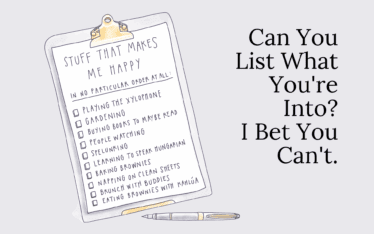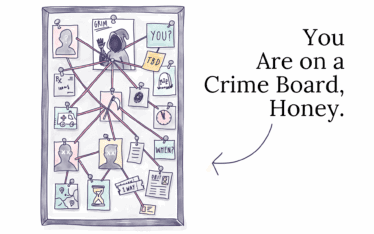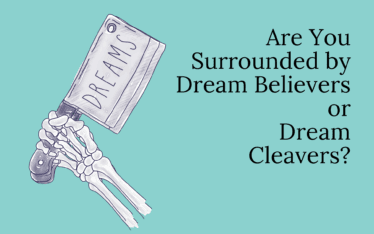Okay, eager pupils, it’s time for a pop quiz about how comparison robs us of the warm and fuzzy feelings of aliveness! And because you’re on the other end of an invisible Wi-Fi radio wave, I won’t even know if you cheat. (I’m totally fine if you cheat.)
Question 1: What would most people rather?
- Get a $15k raise at work, and then find out others at your same level got a $19k raise
- Get no raise at work, but find out through gossipy Jeanette in HR that you’re making more than everyone at your level
- Get a lifetime supply of tater tots in lieu of a raise
The answer: most people say b (but you picked c, didn’t you? I like you so much for that).
Question 2: Teddy Roosevelt famously asserted:
- “Comparison is the thief of joy”
- “Democracy is the thief of joy”
- “Colonoscopies are the thief of joy”
The answer: a (but we all know he’d have said c if they had invasive intestinal procedures in the early 1900s).
Question 3: Who is happiest?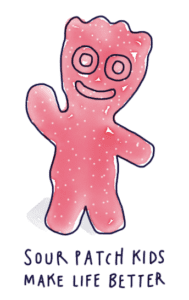
- The silver medal winner at the Olympics
- The bronze medal winner at the Olympics
- The person sitting at home eating Sour Patch Kids while criticizing everyone’s technique at the Olympics
The answer: b (although let’s not abandon c as a viable answer, because Sour Patch Kids Make Life Better [one of my personal mottos]).
Wait, what? Bronze is happier than silver? Explain all this, please.
Of all the ways we are deranged fascinating as a species, our propensity to compare ourselves to others is one of the most detrimental things we do to ourselves (and this says a lot for a society that enthusiastically endorses Brazilian waxes).
Our sense of satisfaction with our objective circumstances doesn’t exist in a vacuum; we must look around and compare how we’re faring compared to everyone else in a relevant circumstance. What we really want to know is, are we keeping up with the Joneses?
Getting a pool in our backyard, for example, isn’t enough to make us happy. No, we have to benchmark the body of water that’s supposed to make us happy against all the pools in our social sphere. If their pool has a swim-up bar, our pool sucks. If their pool isn’t much bigger than a turtle kiddie pool, our pool remains just fine.
I experienced the crushing comparison conundrum in 2013 when I was setting up my first coaching website. At first I was feeling all good about my little site — not hating my picture too much, okay enough with the words I used to describe myself, happy with the famous quotes I had chosen to do some heavy lifting in the “I’m a Deep Thinker” department. Then I’d look at what other coaches were doing online — you know, to get some inspiration and validation. Instead of feeling inspired I felt like an inadequate hack. I deflatingly compared my starter site to other coaches’ sites with glowing testimonials, impressive Fortune 100 client logos, and better hair. How could I go from liking to lacking so fast? Comparison, the Squasher of all Joy.
I used to marvel (in that way that’s heavily laced with disgust) at how squirrelly people would get about the whole “where I sit” topic at work. (If you want to see people lose their shit, announce you’ll be rearranging the offices and cubicles as people return to the office post-Covid.) People are fine to sit in a cube if their colleagues are also in similar-sized cubicles, but if someone at the same level gets — gasp! — an office — gasp! — comparative behavior rears its ugly head and we get to see the worst of what’s inside them. The same line of comparison-kills-happiness-and-all-reason thinking applies to our job titles, compensation packages, cars we drive, people we’re dating, and what color of medal we win at the Olympics.
Right, question 3 about the Olympics!
Researchers studied Olympic athletes that were talented enough to make it to the podium, and plotted their emotional reactions along a hilariously unscientific-sounding agony-ecstasy scale. They found that gold medal winners were downright ecstatic (obviously), but that the bronze medal winners expressed more happiness than their silver winning competitors. These 2nd and 3rd placing athletes had different standards of comparison; the silver medalists were comparing themselves upwards to the gold-encrusted winners (“I came so close! That could have been me! I hate this national anthem! I’m on the agony end of that stupid scale!”), whereas the bronze medalists were comparing themselves downwards to the losers who’d have to fly home without a medal of any color to brag about (or bite, like they so often and weirdly do in photos). Silver medalists were caught up in what psychologists call “what might have been” counterfactual thinking (a.k.a.: fertile ground for rumination)… “I coulda been a somebody, but now all I have is this second-best medallion to hang myself with.”
Psychological scientists have been onto social comparison theory for years, and make it clear that while we usually compare ourselves upwards (to the damned Joneses with their swim-up bar and copious flamingo pool floaties), there are times when downward social comparison has its place. We can restore our sense of self-esteem when we compare our lot in life to those who have it worse off: “I didn’t win gold, but at least I got on the podium.” Downward comparison clearly becomes problematic when we put others down to feel better about ourselves: “My house might not be the McMansion I aspire to own, but at least I’m not living in a dump like Bob and Birtha’s place (ouch)”… or “I might not be in the corner office, but at least I’m not sitting in the cube farm like Ali the Worker Bee (ouch).” (You get the idea.) (I hope.)
Money + Comparison = Never, Ever Happy.
We get awfully comparey-scary when it comes to how much we make, don’t we? H.L. Mencken said in the early 1900s that “a man’s satisfaction with his salary depends on whether he makes more than his wife’s sister’s husband” and we all know it’s still true today (for men and women and husband’s brother’s wives, too).
Question #1 in the pop quiz above was based on a study that summarized their findings like this: “We find that the ranked position of an individual’s income predicts general life satisfaction, while absolute income and reference income have no effect.” WE DON’T CARE HOW MUCH WE MAKE, AS LONG AS IT’S MORE THAN THE GUY NEXT TO US. The researchers also underscored their point by saying, “satisfaction is gained from each ‘better than’ comparison and lost for each ‘worse than’ comparison.” We’re notably happier when we think we’re paid more than our colleagues, even if we’re ostensibly paid shit, and remarkably unhappier when we think they’re getting more dough, even if we’re getting paid handsomely. I don’t make this stuff up — it’s well documented by people in lab coats.
How to not let comparison be a joy burglar in your life:
- Put a pitchfork in your comparison thinking. I know that’s like saying, “stop being hungry while intermittently fasting,” but it’s actually possible to put into your counterproductive comparisons into perspective. Next time you’ve fallen into the trap of “the Joneses have it way better than us,” ask yourself the following: “Is there a different way to evaluate myself, independent of anyone else?” “If we lived alone on an island, would we be happy with our situation?” “Should we just kill the Joneses already?”
- Let gratitude do some heavy lifting. Positive psychology enthusiasts will nod with me here, knowing that gratitude is the ointment that cures almost all the ills of life (mild overstatement, but almost true). When you’re succumbing to feelings of hatred for Stacey because her presentation at work was so much more fabulous than yours (oh, and her shoes too — always her shoes, dammit), ask yourself this and then truly dwell on the answer: “What do I have to be grateful for?” Focusing on what you have, and truly appreciating it, melts the shameful feelings of Not-Enoughness.
- Try to turn your upward social comparison tendencies into motivators. Feeling ‘less than’ compared to someone in a ‘more than’ situation is normal, especially if you’re achievement-oriented or competitively driven. You know what else is normal, and more productive? Letting someone’s ‘more than’ situation motivate you to improve, aspire, reach, dream, stretch, and all the other synonyms associated with not being whiny about your colleague getting a fancy new job title. You could taste bitter resentment for not comparing to her success, or high five her and ask her for tips on how she got promoted.
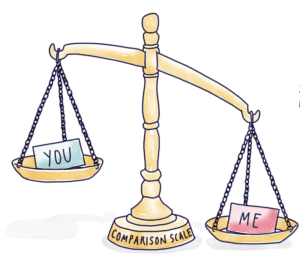 So there we have it. Our objective achievements often pale in comparison to how our accomplishments are subjectively seen — which makes us entirely absurd and yet also heartbreakingly human.
So there we have it. Our objective achievements often pale in comparison to how our accomplishments are subjectively seen — which makes us entirely absurd and yet also heartbreakingly human.
Maybe shining the spotlight on how often you tend to size up your accomplishments or situations in life against others might be enough, to break the pattern and sit more comfortably and confidently in your enoughness. And if this newfound awareness fails? Rest assured knowing that you’re not alone, and probably not as bad of a comparer, when you compare yourself to all the other comparers out there.





